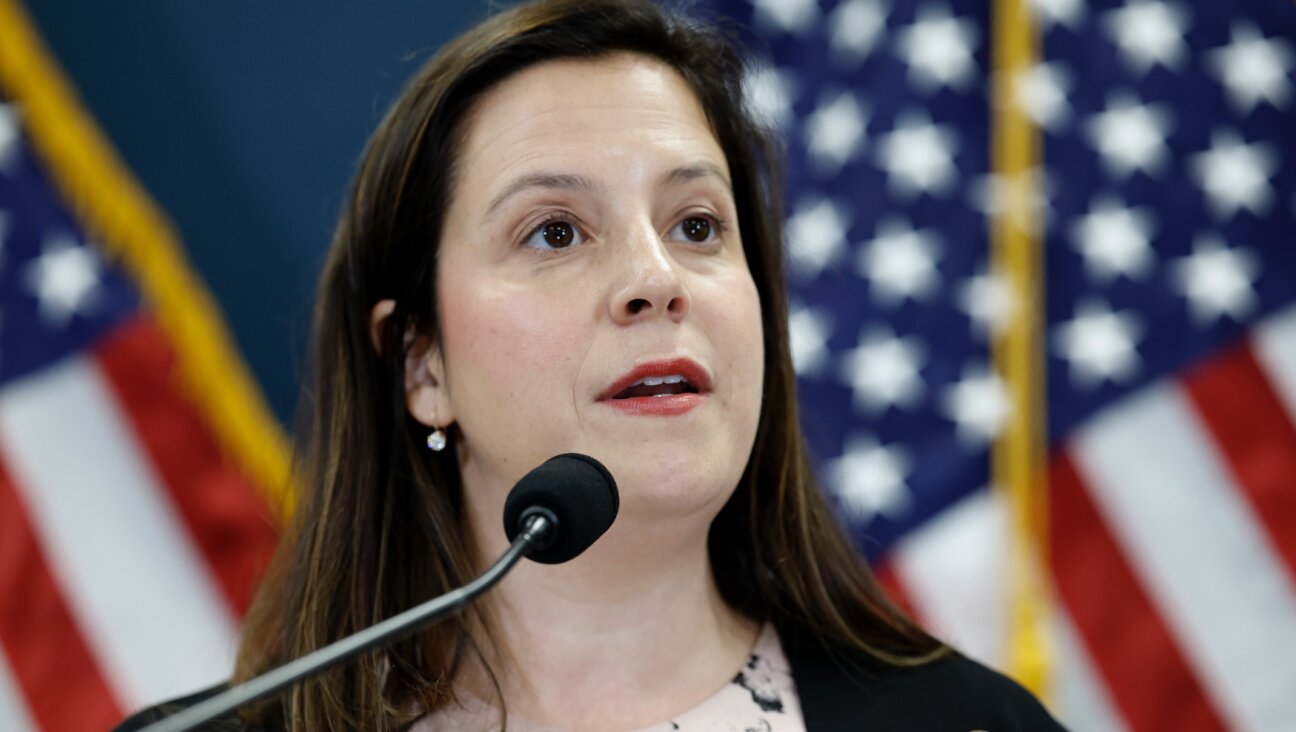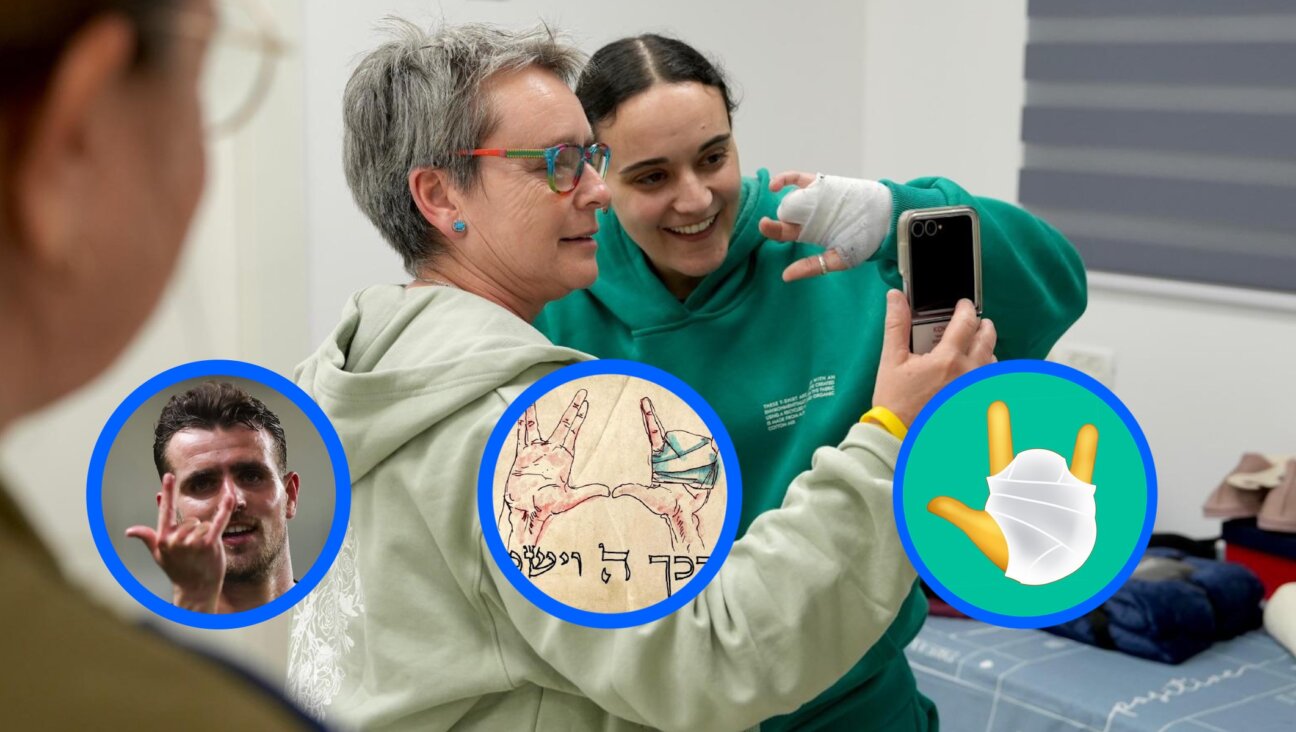Brooklyn Soup Kitchen to Serve Meals for the Hungry — on Fine Hollywood China

Bella and Edward’s wedding reception, complete with Twilight china pattern. Image by Courtesy of Summit Entertainment

Masbia chef Ruben Diaz (left) receiving the fine china from Tammy Carmona of Carmona New York. Image by Alexander Rapaport
What do Brooklyn’s poorest residents have in common with the guests at Bella and Edward’s wedding in the popular vampire movie The Twilight Saga: Breaking Dawn — Part 1?
They could soon find themselves eating off the elegant dinnerware featured at the fictional wedding reception.
Masbia Soup Kitchen Network, a project to alleviate hunger among New York’s poor, has been seeking donations of money and kitchen equipment as it prepares to open at a new location in the heavily Orthodox Brooklyn neighborhood of Boro Park.
Related
Enter: Tammy Carmona, a party planner and creative whirlwind, who owns a Brooklyn-based tabletop company called Carmona New York. Carmona responded to Masbia’s plea on Facebook for almost 200 items it was still lacking for the new facility.
“Talk to me about dishes,” Carmona messaged the group.
Alexander Rapaport, Masbia’s executive director and co-founder (with Mordechai Mandelbaum), quickly got in touch, and a week later acquired 250 place settings of a pattern called Twilight, which Carmona designed for the vampire movie. She values her donation at more than $15,000. (Oprah Winfrey named Carmona dinnerware one of her favorite things of 2013.)

Bella and Edward’s wedding reception, complete with Twilight china pattern. Image by Courtesy of Summit Entertainment
Such dinnerware may seem out of place in an ordinary soup kitchen — but Masbia soup kitchens are far from ordinary. They are designed to preserve the dignity of the diners. “We try to give it a restaurant feel,” Rapaport said, “a feel of people being invited, being comfortable, feeling that they can come into a communal, middle-class place, so to speak, rather than feeling like a place where you’re getting a handout.”
Volunteer waiters serve the food. And in the new location, dishes will replace disposable plates — part of an effort to go green, Rapaport said.
The soup kitchen’s new, upcoming Boro Park location is just a block from Shomrei Shabbos, a 24-hour synagogue whose wee-hour availability for prayer minyans has been reported in The New York Times and other media outlets. Masbia’s other locations are in Rego Park, Queens, and the Flatbush section of Brooklyn.
So what made Carmona reach out and offer her donation?
An Orthodox single mother of five, she was born in Ramat Gan, in Israel, to a mother whom she described as mentally ill.
“I was not exactly homeless, because I did have a house if I wanted to be abused,” she said. “Often I went to sleep hungry.”
Carmona said she wished she’d had a place like Masbia when she was a child.
At 17, she married an American and moved to the United States. Making the donation to Masbia, she explained, gave her a sense of closure.
“To be able to give back to people who don’t have anything, not even food,” she said. “I was once one of those people, and I’m now on the other side. You don’t forget where you came from.”
Masbia’s chef, Ruben Diaz, accompanied Rapaport to Carmona’s showroom to pick up the new dinnerware, and said he found the experience moving.
“It was an emotional connection because she had a very hard time,” Diaz said. “If you have a hard time, you come to Masbia and you see that the food is great, the place is great, you’re going to be a little more happy that day. With her donation of such expensive and elegant plates, the new location at Boro Park is going to be totally beautiful, it’s going to be like a high-class restaurant.”

The Twilight pattern. Image by Alexander Rapaport
The story of how Carmona came from where she began, to making those elegant plates — and how they ended up in a major motion picture — is one of sheer determination.
“It all started just to prove my worth,” Carmona said. “I was told I was not worth anything. I came from a Hungarian family where everybody baked. I started baking just to prove that I could. And people liked my cakes, so that became a business.” Baking led to party planning — Carmona would buy flowers for an event and rearrange them because she didn’t like the way they were done.
Next came Tulips & Pansies, a Manhattan-based fundraising competition for Village Care of NY, to raise money for people with HIV/AIDS. She competed against a number of top floral designers. “I was the only Jewish girl there, and I took first place three years in a row.”
Next, she became a wedding planner. And in the same way that she wasn’t satisfied with other people’s floral arrangements, she found herself unimpressed with the dinnerware she had to choose from when planning events. “I never found dishes I love, “ she said. “I decided somebody’s got to do it. So I created my own.” She designed Twilight for the movie, and now manufactures it for sale.
“I saw online that they were looking for donations for Masbia, and I said, let me see what I can do. I donated Twilight because it was very popular. For me it’s a closure of a circle. Coming from nothing, going all the way to Hollywood, and doing it all on my own.”
Related
Kosher Soup Kitchen Opening Was ‘Imminent’ — So What Happened?
Liza Schoenfein is the food editor of the Forward. Contact her at [email protected] or on Twitter, @LifeDeathDinner
A message from our Publisher & CEO Rachel Fishman Feddersen

I hope you appreciated this article. Before you go, I’d like to ask you to please support the Forward’s award-winning, nonprofit journalism so that we can be prepared for whatever news 2025 brings.
At a time when other newsrooms are closing or cutting back, the Forward has removed its paywall and invested additional resources to report on the ground from Israel and around the U.S. on the impact of the war, rising antisemitism and polarized discourse.
Readers like you make it all possible. Support our work by becoming a Forward Member and connect with our journalism and your community.
— Rachel Fishman Feddersen, Publisher and CEO
























